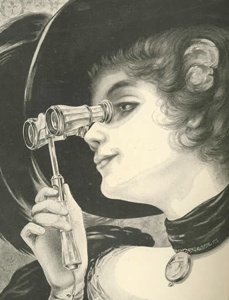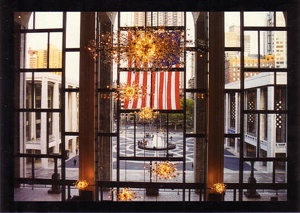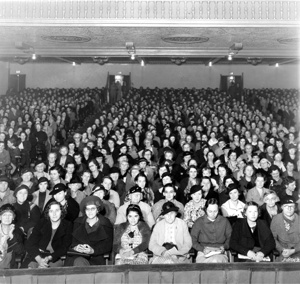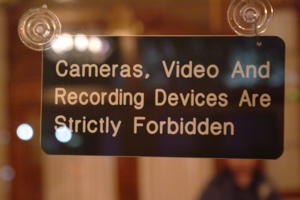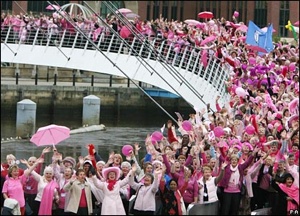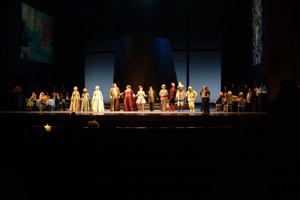 History
History  History
History  Animals
Animals Ten Times It Rained Animals (Yes, Animals)
 Mysteries
Mysteries 10 Devastating Missing Child Cases That Remain Unsolved
 Creepy
Creepy 10 Scary Tales from the Middle Ages That’ll Keep You up at Night
 Humans
Humans 10 One-of-a-kind People the World Said Goodbye to in July 2024
 Movies and TV
Movies and TV 10 Holiday Movies Released at Odd Times of the Year
 Politics
Politics 10 Countries Where Religion and Politics Are Inseparable
 Weird Stuff
Weird Stuff 10 Freaky Times When Famous Body Parts Were Stolen
 Miscellaneous
Miscellaneous 10 Interesting Things Manufacturers Stopped Making and Why
 Gaming
Gaming 10 Funny Tutorials in Games
 History
History 10 Desperate Last Stands That Ended in Victory
 Animals
Animals Ten Times It Rained Animals (Yes, Animals)
 Mysteries
Mysteries 10 Devastating Missing Child Cases That Remain Unsolved
Who's Behind Listverse?

Jamie Frater
Head Editor
Jamie founded Listverse due to an insatiable desire to share fascinating, obscure, and bizarre facts. He has been a guest speaker on numerous national radio and television stations and is a five time published author.
More About Us Creepy
Creepy 10 Scary Tales from the Middle Ages That’ll Keep You up at Night
 Humans
Humans 10 One-of-a-kind People the World Said Goodbye to in July 2024
 Movies and TV
Movies and TV 10 Holiday Movies Released at Odd Times of the Year
 Politics
Politics 10 Countries Where Religion and Politics Are Inseparable
 Weird Stuff
Weird Stuff 10 Freaky Times When Famous Body Parts Were Stolen
 Miscellaneous
Miscellaneous 10 Interesting Things Manufacturers Stopped Making and Why
 Gaming
Gaming 10 Funny Tutorials in Games
Top 10 Tips For Your First Opera or Ballet
So you’ve been reading all of the List Universe lists and have decided that you too would like to attend an opera or ballet. The trouble is you have never been to one, and are a bit intimidated. Fear not! As always, List Universe is here to the rescue and with just a few quick tips you too can behave in a pretentious, snooty fashion and impress and/or annoy friends and family. Trust me, nothing will get rid of that obnoxious coworker faster than saying, “Wow – that story about how your dog can belch the alphabet reminds me of something that happened at last night’s opera performance. It’s kind of a long story; perhaps I should start at the beginning…”
1. What to See
There is a reason that the “classical” operas and ballets are classics; they’re very good and worthy of being performed over and over. If you are familiar with and like the music from any particular opera or ballet, that might be a good one to start with. Or, you can simply call your nearest company or go to their website and ask them which they would recommend. Opera and ballet companies are always very happy to have new attendees; particularly since the average age of fans tend to be a bit on the older side (147 years old, to be exact). I would suggest any of the “story” ballets to begin with, such as Swan Lake, Coppelia, Sleeping Beauty or of course the Nutcracker. If you feel a bit more adventurous, you can attend one of the more abstract ballets. You can also sometimes find ballets choreographed to a certain type of music, or a certain songwriter. If you know that you’ll enjoy the music you’re at least assured of having a pleasant evening. Be aware that most operas are quite depressing; usually at least one or two characters do not survive; in some of them none of the main characters live to the end! If you’ve watched enough Quentin Tarantino movies and can take the carnage, I’d recommend anything by Puccini or Carmen, because you will recognize some of the music. Or, you usually can find a more light-hearted opera such as The Elixir of Love, Cosi Fan Tutte, or the Marriage of Figaro. Don’t worry about not understanding what’s happening; many operas now have OpTrans, which displays the words in English above the stage. Also, you will get a program with a synopsis, which will tell you the plot. If you are totally undecided on opera versus ballet, choose the ballet. Ballet dancers are in excellent physical shape and almost always wear skimpy costumes displaying their lovely legs; opera singers wear circus tents. At least you’ll have something to look at the ballet.
2. Who to Go With
Go with whomever you’d like to bring and whom you can drag along with you. Married couples, dating couples, platonic friends, anything goes. Opera and ballet being cultural activities, no one is going to bat an eye if you’re a man and bring another guy, or a woman who brings a man twenty years younger than her, or five women who go together, or even if you go alone. I would recommend against bringing any of the following: young children who either cannot sit still or who will not understand that the woman on stage did not just really kill herself, people who fall asleep when they sit in the dark and then begin to snore, people who cannot survive for ten minutes without checking their mobile phones, and people with bladder issues unless they have an aisle seat. Oh, and please, for the love of God, do not bring people who feel compelled to sing or dance along!
3. Tickets – When to Go, Where to Sit, How to Get Them
If you were feeling a bit nervous, I’d recommend either a weeknight or a weekend matinee. These tend to be less formal. If you look online, you can usually find a seating chart of the venue with the pricing structure. Take a look at it before you call for tickets. Oddly, the most expensive sections are not necessarily the best value. I’d much prefer to sit in the first row of one of the less expensive sections than two rows ahead of that for an additional $10 a ticket. It’s also nice to sit towards the center of the theater; it’s pointless being five rows from the stage if you’re in the end seat on the right and you can’t see half of the performance. If you’re on a budget or just don’t feel like spending much money, don’t be at all embarrassed by or worried about buying the least expensive tickets. You’ll still be able to hear quite well, and to see the performance nicely. Also, the cheapest seats often tend to be taken up by students, so people will assume that you’re an actual fan rather than someone who is just attending to see and be seen! Normally you should just be able to call the box office and they will help you purchase tickets. They can be mailed to you or you can pick them up at the box office a day or two before the performance if you’re in the area. If you’re buying them at the last minute, you can pick them up right before the performance at the “will call” window at the box office. If the performance you want to see is sold out, it’s worth trying again in a day or two; subscribers often turn their tickets back in for resale if they cannot attend on their scheduled night. Or, you can buy them from brokers but I’m afraid you’re on your own with that. (They’ll be the guys standing out front in sports team jackets with signs saying, “I need tickets”. Or maybe that’s for football games….) Since you will probably use your credit card to buy the tickets, you will also quickly end up on every cultural mailing list in the city. This will really impress your postman if no one else.
4. What to Wear
Black tie and tails for men, and evening gowns with opera gloves for ladies, of course. No, I’m completely kidding. I really think that that’s the number one reason that most people are worried about going, and it’s not at all a concern. Unless you’re going to opening night, or possibly in Europe, you will see very few people dressed that formally. (And of those, I think 80% are because the women want a chance to dress up and they’ve forced their men into black tie. The other 20% are men who want to dress up.) A jacket for men and a nice dress for women will be more than suitable. If you’re attending on a weeknight, many people will not have changed from work so any range of business attire will be seen. Matinees can be even more informal; I’ve seen people wearing jeans. The exception is if you are bringing a little girl, particularly to the Nutcracker. In that case, she is required to dress in the most beautiful velvet dress available with lace trim, tiara, white tights and whatever else little girls know that they are secretly princesses should wear.
5. What to Bring and When to Arrive
Now you’re looking quite elegant, so don’t ruin the effect by lack of planning now. Bring opera glasses or small binoculars if you have them. Unwrapped hard candies and/or breath mints and a handkerchief or tissue are good to have as well (even if you never cough, for some reason being in a theater seems to cause choking fits). Make sure you have an umbrella if there is any chance of rain, and appropriate outerwear (and underwear!). Ladies, your purse will either be on your lap or on the floor at your feet so I would suggest not bringing that huge one that doubles as a weekend tote. Plan on how long it will take you to arrive there on time if the traffic is terrible, and then leave at least fifteen minutes before that. Everyone else is going to be arriving at the same time and everyone will be trying to park in the same garage or get out of cabs on the same street. You do not want to rush in at the last minute, all sweaty and out of breath. Remember, you are a high-class person now; Cary Grant was never disheveled and rushed. Also, if you arrive late you will not be seated until the ushers feel it’s an appropriate time to let you in. You did not go to all of this effort to spend the entire first act in the lobby watching the performance on the closed circuit television, did you?
6. Upon Arrival
Here you are! Usually at the entrance doors you will be greeted, and someone will take your tickets and return the stubs. At this time they will normally tell you in which direction to go (up the stairs, to the door on the right, etc.) Since you have cleverly arrived early, you will have plenty of time to find the coatroom and the restroom. Now is also your chance to admire your fellow patrons of the arts. It will seem that everyone else knows each other and you know no one. Do not believe this. No one else knows anyone either, except the ten people who attend every performance so that they can shriek “Dahling!” across the lobby at each other just to make you feel insecure. Ignore them. In some venues you can go to the bar and pre-order an intermission drink. This is quite snazzy because they will give you a number and at intermission you will come out and find your drinks nicely waiting on a table with your number on it, while the hoi polloi is fighting their way to the bar desperately trying to get a glass of wine so they can swill it and be back by the next act. You can calmly sip your drink and laugh at them. See? You’re well on your way to being snooty and pretentious already!
7. Time to Sit
Everyone else is heading towards the seats and for some reason there has apparently been a power surge because the lights dimmed for a second and a chime-like alarm went off. This means that the performance will begin shortly. So head on in. Hopefully, an usher will be on hand at the entrance to the seating area. You will hand them your ticket stubs; they will look at them and give them back. Then they will hand you programs and lead you to your seats. They will not wipe your seats off with a cloth like they do at the stadium because you are indoors. Hence, you do not have to tip them, a courteous thank you will do. Invariably, if you are in the middle then the people on the aisle are already sitting. If you are on the aisle, the people in the middle will arrive after you. If you are close enough to the aisle you may choose to just stand and move back into the aisle to let them in. If you are further in, generally you stand as they pass in front of you, or you may twist your knees to the side so they can pass. If you are the one coming through, face forward (toward the stage) and sidle sideways excusing yourself non-stop the entire way. All participants in this little dance are socially obliged to pretend that they are not rubbing up against and being rubbed up against random unattractive strangers. Now that you’re seated, it is your chance to read your program. Read the synopsis so you know what’s going on, see how long you have to wait until intermission, look to see who you know who has donated money, and complain about the fact that your health insurance company which is supposed to be a non-profit has enough money to donate to the arts but just raised your premiums again.
8. The Performance Begins – Basic Etiquette
The lights have dimmed, and all the sudden people are clapping for no apparent reason. This is generally because the conductor of the orchestra has arrived. The orchestra is seated down in the front in a sort of subterranean level known as the orchestra pit. Occasionally someone on stage will fall into this pit, but that happens less often than you might think. Now the music begins. Do not talk anymore! Just because the curtain is not up yet does not mean that the performance has not started; it has! Hopefully you have turned off your mobile phone, and by off, I mean OFF. Vibrate is not off because it will still buzz and can be heard. And just because your phone is silent does not mean that it is acceptable to send text messages or to check them. Every time you do everyone in your row will automatically glance over at the sudden flash of light from your phone. Even if you are miserable, bored and not enjoying yourself, sit still, be quiet and leave at intermission. If you begin having a coughing or sneezing fit, you have your hard candy ready. If it continues, at some point you will have to determine whether or not you will annoy people more by squeezing past in the middle of a performance or staying in your seat while coughing out a lung. Just remember that sound travels an incredible distance in the theater because of the lovely acoustics, so any noise you make is disturbing people six rows behind you. If for some reason you get bored amuse yourself by glaring at people near you who do not have as much couth as you do and who are behaving badly.
9. When to Applaud
What an incredible performance! You’re so glad that you came. You never knew that operas and ballets had such incredible stage settings, and the lights and special effects are dazzling as well. The singing or dancing seems great to you, so you want to applaud. But when? In ballet, the audience will applaud at the end of a great dance. This generally tends to be after a pas de deux, where two dancers perform together, or after a solo (one dancer). Sometimes the audience will begin to applaud during a dance, usually when the dancer can spin or leap around and around in circles for an extended period without toppling over or falling into the orchestra pit. Opera audiences are more finicky and do not applaud as often. They tend to applaud infrequently, only after particularly beautiful arias (songs) and never until they are over. Unless you are absolutely sure that it is in fact the end of the song, it’s probably best to wait until the rest of the audience applauds. If you stand up and start screaming “Bravo” in the middle of Vissi D’Arte you will greatly irritate everyone else and humiliate yourself (especially since you should be screaming “Brava” but that’s for a more advanced lesson). It is also customary to applaud at the end of each act (when the curtain falls and the house lights come up).
10. Intermission
Now you’re an old pro at this cultural thing, so you get a chance to enjoy yourself. Time to go and get a drink, go outside to have a cigarette, wander out to the lobby to stretch or use the restroom. As for the restrooms, there will of course be a long line for the ladies room. If you are near one (and if you are a lady or even just a regular woman) it’s best to rush there immediately when the lights come up, knocking over everyone in your path. Otherwise there will be a huge line, which you will spend the entire intermission standing in. If you do not get there in the beginning, wait until the end of intermission when the line is finally back down to a few people. When intermission is ending, the lights will briefly dim again and you will hear the warning chime. Return to your seat and climb over your neighbors again; you’re old friends by now so it’s easier this time.
Bonus: The End
It’s all over! You survived and even enjoyed it! What an incredible performance it was; you’re already planning what to see next. Everyone around you is still applauding, and it’s still dark, even though the curtain has come down. That’s because now is the time for the curtain call. If you even think about leaving now you will show the world that you are a low-class lout who is unfit to be in civilized society. Just like you would not dine in a restaurant if you cannot afford to tip, if you cannot spend the five or ten minutes at the end to express your appreciation of the performance than you should have stayed home. The performers may come in front of the curtain or the curtain may rise again. Generally the more minor characters will appear first, and you get to applaud for them. The performers will continue to appear or step forward in reverse order of importance; at the end is when the major stars will appear. That is when you are allowed to whistle, cheer, yell, and clap until your hands bleed. You may also choose to stand up if you like; this is a standing ovation. And yes, the performers can see that the audience is on their feet, and yes, they really, really do appreciate it. When the curtain falls and stays down and the house lights come up, it is time to go. Rather than fight traffic, now is a great time to go have dinner or a drink, especially because you will place your program next to you on the table or bar, and someone is certain to ask you how the performance was. The proper answer is always some variation of “Excellent!”,”Very good!”, “Incredible!” or “Outstanding!” and the best part is, you will mean it.
Contributor: Mathilda




